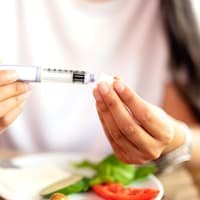
What exactly is diabetes?
"The pancreas produces too little insulin or none at all. Or it doesn't work properly. But our body needs this hormone to get sugar into the cells. Without insulin, the blood sugar level rises. A distinction is made between type 1 and type 2 diabetes. Type 1 is hereditary, affecting only around five percent of those affected. Type 2 is often linked to obesity, poor diet and lack of exercise."
Why do so many people get type 2 diabetes?
"People are getting older and older - diabetes is also a disease of old age. Of course, obesity, lack of exercise and poor diet are contributing factors. And: the number of unreported cases is falling, diabetes is being diagnosed more and more often." Can too little sleep cause diabetes? "Too little sleep or a disruption to the normal day-night cycle can upset the hormone balance after just a few days. This can lead to insulin resistance. The balance of hunger-regulating hormones shifts."
Can the disease be reversed?
"It's not uncommon to be able to at least put type 2 diabetes into a dormant state and bring the values back into the normal range through a healthy lifestyle. I know it's not easy to change your lifestyle - but it's worth it! The most important thing is to get rid of excess kilos. If you give up smoking, you reduce your risk by 30 to 50 percent. Carbon monoxide contained in smoke may have a harmful effect on fatty tissue and the pancreas, and less insulin is produced. Stress upsets the metabolism."
What happens if diabetes is not recognized?
"The blood vessels can be destroyed and the nerves and organs damaged. If left untreated, diabetes can lead to blindness, for example, or cause massive damage to the kidneys. The risk of a heart attack or stroke is significantly increased."
What therapies are prescribed?
"Those affected receive training and advice on how they can change their diet and incorporate more exercise into their everyday lives. If the values don't go down, tablets are prescribed: they either prevent the absorption of sugar in the intestine or increase the release of insulin from the pancreas into the blood. If the insulin requirement can no longer be regulated by the body itself, insulin is administered via syringes, pens or pumps."
Is type 2 diabetes hereditary?
"Type 2 diabetes itself is not inherited - but the predisposition to it is. Anyone who has a diabetic in the family should therefore have their blood sugar checked regularly by a doctor. And it is particularly important for those affected to prevent it by adopting a healthy lifestyle. "






